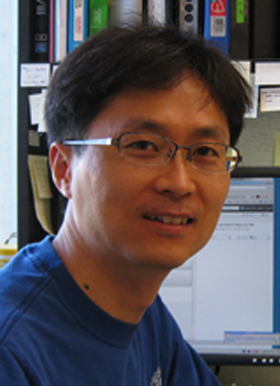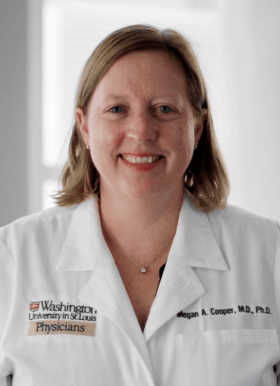
Megan Baldridge, MD, PhD
Assistant Professor
Division of Infectious Diseases
Washington University School of Medicine in St. Louis
Title of project: Regional regulation of enteric virus infection by the commensal microbiome
(5/01/17 – 4/30/19)
Dr. Baldridge is an Assistant Professor in the Department of Medicine, Division of Infectious Diseases. Her funded project will further uncover the interactions between the microbiome, virus, and the host in different regions of the intestine. She will determine the effects of the microbiome on regional cellular viral tropism throughout the intestine using viral quantification and immunofluorescence assays and define the specific bacteria associated with murine norovirus infection in different regions of the gut using laser capture microdissection followed by next-generation sequencing to identify bacterial taxa. Her studies will make use of newly-developed techniques to explore these questions from novel angles and pursuit of these aims will also facilitate development of new methods and technical expertise.

Jaebok Choi, PhD
Assistant Professor
Division of Oncology
Washington University School of Medicine in St. Louis
Title of project: Effect of JAK1/JAK2 Inhibition on Intestinal Stem Cells and Tissue Repair
(5/01/17 – 4/30/19)
Dr. Choi is an Assistant Professor in the Division of Oncology. His funded project will determine the effect of baricitinib on ILCs using flow cytometry and Paneth cells and ISCs in the GI tract using immunofluorescence microscopy. Most patients receiving allo-HSCT suffer from GI GvHD, the major complication of allo-HSCT, due to human leukocyte antigen (HLA) mismatch. Dr. Choi’s work will provide mechanistic insights into not only GI GvHD, but also other chronic inflammatory diseases such as IBD, Crohn’s disease and ulcerative colitis. His study’s goal is to provide an inexpensive, safe and effective way of overcoming these diseases.

Megan Cooper, MD, PhD
Assistant Professor
Department of Pediatrics Rheumatology
Washington University School of Medicine in St. Louis
Title of project: Intestinal epithelial cell turnover in a murine model of STAT3 gain-of-function
(5/01/17 – 4/30/18)
Dr. Cooper is an Assistant Professor in the Department of Pediatrics, Division of Rheumatology. Her funded project will study a group of patients with genetic abnormalities in STAT3 that causes increased STAT3 function and leads to early-onset autoimmune disease. Most of these patients suffer from gastrointestinal disease including inflammation of the intestines and liver. To further investigate how mutations in STAT3 lead to a human disease, her laboratory generated two mouse models with mutations in the murine Stat3 gene corresponding to those found in patients. Preliminary evaluation of the gastrointestinal tract of these mice suggests that they have abnormalities of their small intestines with increased proliferation of epithelial cells. Her work hypothesizes that increased STAT3 function leads to a phenotype similar to that seen with viral infection and type I interferon signaling with increased epithelial cell turnover and that this is a precursor to inflammation of the intestines. The aims of this project are to: 1) Investigate epithelial cell proliferation in a larger group of mice with Stat3 mutations, and 2) Determine if viral infection alters epithelial cell proliferation in mice with Stat3 mutations and induces enteritis. Dr. Cooper will use in vivo mouse models to complete these studies. This anticipate that this project will provide insight into the mechanisms whereby increased STAT3 function causes inflammation of the intestines and liver in patients.

Samantha Morris, PhD
Assistant Professor
Department of Developmental Biology and Genetics
Washington University School of Medicine in St. Louis
Title of project: Single-cell RNA-seq mapping of an in vitro intestinal regeneration model
(5/01/17 – 4/30/18)
Dr. Morris is an Assistant Professor in the Department of Developmental Biology and Genetics. Her funded project will study the overarching hypothesis that in vitro intestinal organoid models can recapitulate the in vivo microenvironmental cues to fully differentiate iEPs to mature, functional intestine. The innovation of this project is that we will establish a tractable platform to enable the precise charting of intestinal differentiation from an induced progenitor state, with single-cell resolution. This will pave the way for generating an array of gastrointestinal cells for therapy, and in vitro disease modeling.

Guoyan Zhao, PhD
Assistant Professor
Department of Pathology & Immunology
Washington University School of Medicine in St. Louis
Title of project: Characterization of a Novel Gene Associated with Inflammatory Bowel Disease
(5/01/17 – 4/30/18)
Dr. Zhao is an Assistant Professor in the Department of Pathology & Immunology. Her funded project will study the function of IRNG (IBD-related novel gene) and if it is involved in IBD pathogenesis. From preliminary findings, Dr. Zhao hypothesizes that IRNG encodes a secreted protein and functions as a cytokine. The specific aims are: Specific Aim I: Determine IRNG gene expression in different human tissues and in tissues from IBD patients by computational analysis of published RNA-Seq data. Specific Aim II: Test the hypothesis that IRNG encodes a secreted protein. Specific Aim III: Identify cell-intrinsic function of IRNG by comparing gene expression profiles between wild-type cells and Caco-2 cells lack IRNG function with and without virus infection using RNA-seq. The overall goal is that if IRNG is involved in IBD pathogenesis, it would offer a potential novel target for IBD treatment.